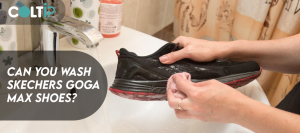Table of Contents
Introduction: Are Crocs Considered Shoes?
When it comes to shoes, the topic of Crocs often leads to a lively discussion – a story of either passionate love or strong dislike. Famous for their comfortable rubber material, ability to keep feet dry, and unique design, Crocs have become an integral part of modern footwear.
However, an important question remains for those who want both comfort and protection for their toes: can Crocs be considered closed-toe shoes? In this investigation, we uncover the secrets behind Crocs and their categorization, examining the details that make these shoes stand out.
Are Crocs Considered Closed Toe Shoes? Quick Answer
Yes, Crocs are considered closed toe shoes, but it depends on the specific model. The iconic Classic Crocs, with their ventilation holes, do not meet the formal health and safety definition of closed toe shoes.
However, Crocs offers various closed toe models, such as the Specialist Clogs and On-the-Clock Work Clogs, which feature a covered toe box and no ventilation holes, meeting the criteria for closed toe footwear. When considering Crocs, it’s essential to explore the diverse range beyond the classic design to find a model that aligns with the closed toe shoe requirements.
What Defines a Closed Toe Shoe?
To put the argument to rest, it’s important to grasp what defines a closed toe shoe. In simple terms, closed toe shoes fully cover your foot, including your toes, and don’t have any openings for ventilation. Now, the question arises: do Crocs fit this description?
The Classic Crocs Conundrum
The renowned Classic Crocs, famed for their 13 unique perforations, cast doubt on their classification as closed toe shoes. In the domain of formal health and safety standards, Classic Crocs fall short of being labeled closed toe footwear due to the presence of ventilation holes, which undermine the prerequisite of complete coverage for the toes.
Crocs’ Diverse Range
Nevertheless, the world of Crocs expands far beyond its classic roots. Many variations, including the Crocs Bistro Clog, present a sealed-toe configuration devoid of any ventilation holes. These alternatives address diverse requirements, particularly in settings that necessitate the use of enclosed footwear.
Identifying Closed Toe Crocs
Identifying closed toe Crocs sets in motion a close inspection of the toe box and ventilation attributes. Specialist Clogs and On-the-Clock Work Clogs, categorized as closed toe Crocs, flaunt a distinctive boat-shaped toe enclosure sans any openings, guaranteeing an all-encompassing shield for your toes.
Top Picks for Closed Toe Crocs
Specialist Clogs
- Toe box covers entire toes
- Semi-open heel
- Slip-resistant tread
On-the-Clock Work Clogs
- Closed toe and closed heel design
- Slip-resistant outsoles
- Primarily designed for the workplace
Bistro Clog
- Covered toe box
- Slip-resistant outsoles
- Small ventilation holes for breathability
Buying Tips for Closed-Toe Crocs
Size Matters
Crocs clogs are known to have a bit more room, so make sure you don’t go for a size that’s too large for your foot.
Heel Strap Flexibility
Choose a heel strap that can flex, either through adjustment or pivoting, for added comfort.
Cushioning Consideration
Opt for a cushioning that provides the right amount for the best comfort experience.
Check the Sole
When checking the sole, make sure it has slip-resistant features to enhance safety.
Ventilation
Even when opting for closed-toe styles, it’s a good idea to include some ventilation for better breathability.
Why the Crocs Craze?
Versatility
Crocs have evolved beyond their original work-centric role, turning into versatile shoes suitable for a range of activities.
Comfort
Known for their incredible comfort, Crocs use Croslite material and provide a personalized fit, delivering softness and orthopedic features.
Materials
Made from Croslite, a material resembling rubberized plastic, Crocs are not only durable but also organic and effortless to clean.
Durability
Crocs’ built-in natural rubber guarantees durability, ensuring they stand the test of time and become a worthwhile investment when well-maintained.
Low Maintenance
Easy-to-clean Crocs need minimal attention, with a simple wash using water and soap.
Water-Resistance
Being water shoes, Crocs are resistant to water absorption, making them ideal for water-related activities.
Slip-Resistance
The slip-resistant soles cater to those constantly on their feet, providing stability on various surfaces.
Bacteria-Resistance
Crocs come with features that help keep bacteria at bay, promoting better foot hygiene.
Lightweight & Breathable
Boasting a lightweight design and iconic ventilation, Crocs offer breathability and easy portability.
The Crocs Critique
Not Recyclable
While reusable, Crocs’ materials make them non-recyclable, posing environmental concerns.
Fashion Debate
Critics often argue that Crocs lack conventional style, labeling them as unfashionable due to their unconventional design.
Interesting Facts About Crocs
Worst Invention
Time labelled Crocs one of the fifty worst inventions in 2010, citing their unattractive appearance.
13 Holes
Classic Crocs clogs sport thirteen holes, providing ventilation and aiding in quicker drying.
Celebrities and Crocs
Celebrities such as Justin Bieber and Ariana Grande caused a fashion sensation by boldly embracing Crocs, sparking a notable shift in the fashion landscape.
Safety Considerations in Crocs Selection
When evaluating the merits of Crocs, it’s important to go beyond their famous comfort and distinctive style. A crucial yet often overlooked factor is safety, particularly in work settings. Let’s examine safety regulations, specifically those outlined by OSHA, to determine whether Crocs can truly be considered closed-toe shoes.
Navigating Safety Standards
In order to determine if Crocs are considered closed toe shoes, it is crucial to have a basic knowledge of the safety regulations established by governing organizations. The guidelines provided by the Occupational Safety and Health Administration (OSHA) hold great authority, particularly in work environments that may pose risks.
Closed Toe Imperative in Work Environments
Closed toe shoes are extremely important in work environments, especially in places like laboratories or medical professions where there are many risks. It is crucial to have shoes that cover the entire foot to reduce the chance of any harm from chemicals, tools, or machinery.
OSHA Guidelines and the Crocs Conundrum
Although OSHA regulations do not specifically mention Crocs, there is a need for careful consideration. The traditional Crocs style, known for its ventilation holes, presents difficulties in workplaces where safeguarding against chemical spills is crucial. This raises the question of whether wearing Classic Crocs could be seen as a breach in certain job situations.
Closed Toe Crocs: Striking a Balance
Understanding the wide range of Crocs styles is essential, especially when it comes to ensuring workplace safety. Closed-toe models, specifically designed for work environments, offer a solution that combines the comfort of Crocs with the safety requirements of closed-toe footwear, making them suitable for various work settings.
Safety and OSHA Integration
Emphasizing safety during exploration highlights the significance of choosing the appropriate footwear. While traditional Crocs may not meet certain workplace safety standards due to their ventilation holes, enclosed-toe Crocs models offer a solution, providing a suitable option for environments with strict safety regulations.
Do Crocs Count as Closed Toe Shoes? Final Thought
In summary, Crocs defy traditional norms in the expansive world of footwear, presenting a captivating paradox. The ongoing discourse about whether they qualify as closed toe shoes unfolds as a multifaceted tale. While the signature Classic Crocs, distinguished by their unique ventilation holes, might not neatly align with conventional health and safety criteria, the brand’s extensive lineup encompasses a plethora of closed toe variations.
Crocs, in essence, resist simple categorization into open or closed toe, emerging as a standalone entity that caters to a myriad of individual needs and preferences. Whether one revels in their comfort or questions their standing in the realm of fashion, Crocs persist as a formidable presence, distinctively shaping the ever-changing landscape of footwear.
Why Are Crocs Called Clogs?
Most Crocs are referred to as clogs due to their similar structure and design.
Are Closed Crocs Good For Toes?
Closed Crocs offer better toe protection than flip-flops, providing arch support and water resistance.
Do Podiatrists Approve Croc Shoes?
Podiatrists acknowledge some benefits of Crocs but suggest exploring other options.
Do Crocs Stretch Over Time?
Yes, Crocs stretch over time due to the non-heat-resistant Croslite material.
How to De-Stretch Crocs Shoes?
Washing and drying Crocs with heat can help in reshaping them according to your feet.




